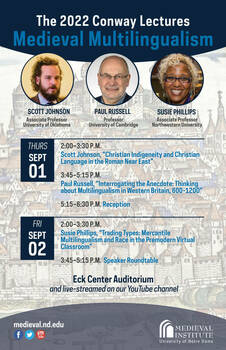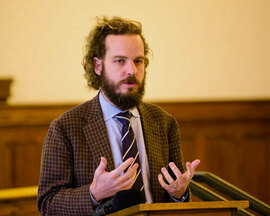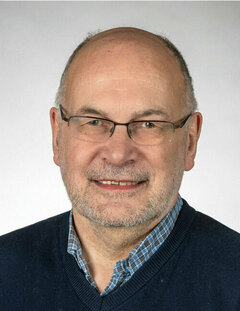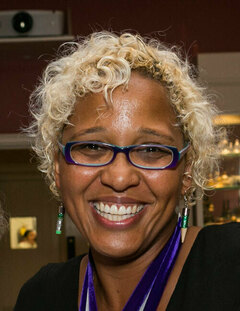The 2022 Conway Lectures: "Medieval Multilingualism"

On Thursday, September 1st, and Friday, September 2nd, the Medieval Institute hosted the 2022 Conway Lectures on the theme of medieval multilingualism.
First inaugurated in 2002, the Conway Lectures are an endowed, annual lecture series supported by Robert M. Conway (’66), a Notre Dame graduate and long-time friend of the Medieval Institute. The lecture series brings senior scholars of international distinction to Notre Dame each fall to speak on topics across a variety of disciplines.

Scott Johnson, Associate Professor of Classics and Letters at the University of Oklahoma, kicked off the lecture series with a talk entitled “Christian Indigeneity and Christian Language in the Roman Near East.” He argued that language in society is one means of accessing assumptions about indigeneity and precedence, particularly in this “language rich” region of the Roman Empire, where layers of memory were appropriated and crafted afresh in order to claim a place within society. Johnson focused on Syriac Christians who were trying to find their place under the regime of the Romans, both before and after Constantine’s conversion, and concluded that Near Eastern Christians’ engagement with Greek is highly instructive for understanding their self-definition and growth as independent groups.

Paul Russell, Professor of Celtic in the Department of Anglo-Saxon, Norse and Celtic at the University of Cambridge, continued the series on Thursday afternoon with a talk entitled “Interrogating the Anecdote: Thinking about Multilingualism in Western Britain, 600-1200.” He began his lecture by noting that while much excellent work has been done on multilingualism in the modern world, rather less attention has been paid to how those findings can be applied to the less well-evidenced areas of the medieval world. Russell then narrowed his focus to a single place, namely, medieval south Wales between 600 and 1200, an area where language-contact and its consequences were played out over a very long period. He then demonstrated how we can learn about and understand this region during this time period despite the limited and fragmentary nature of the evidence.

On Friday afternoon, Susie Phillips, Associate Professor of English at Northwestern University, gave a third talk entitled “Trading Types: Mercantile Multilingualism and Race in the Premodern Virtual Classroom.” She explored the popular vernacular textbooks that flooded the premodern European print marketplace and that opened virtual classrooms to linguists of the lower orders, readers seeking not a thorough knowledge of other languages, but practical lessons in conversation. Modelling all manner of transgression, from insults and pick-up lines to welching on debts, they taught readers the languages of the multilingual market and the tricks of its trade. Phillips showed how these textbooks even asked their audience to imagine the world “otherwise,” shifting their readers’ perspective by making visible figures usually excluded from the representational spotlight such as Black servants.
The event concluded with a roundtable discussion featuring all three speakers, who responded to each other’s work and reflected on medieval multilingualism more broadly.
The lectures by Professors Johnson and Russell are available to view on our YouTube channel.
The Institute thanks Professors Johnson, Russell, and Phillips for offering to our community such insightful and engaging discussions.